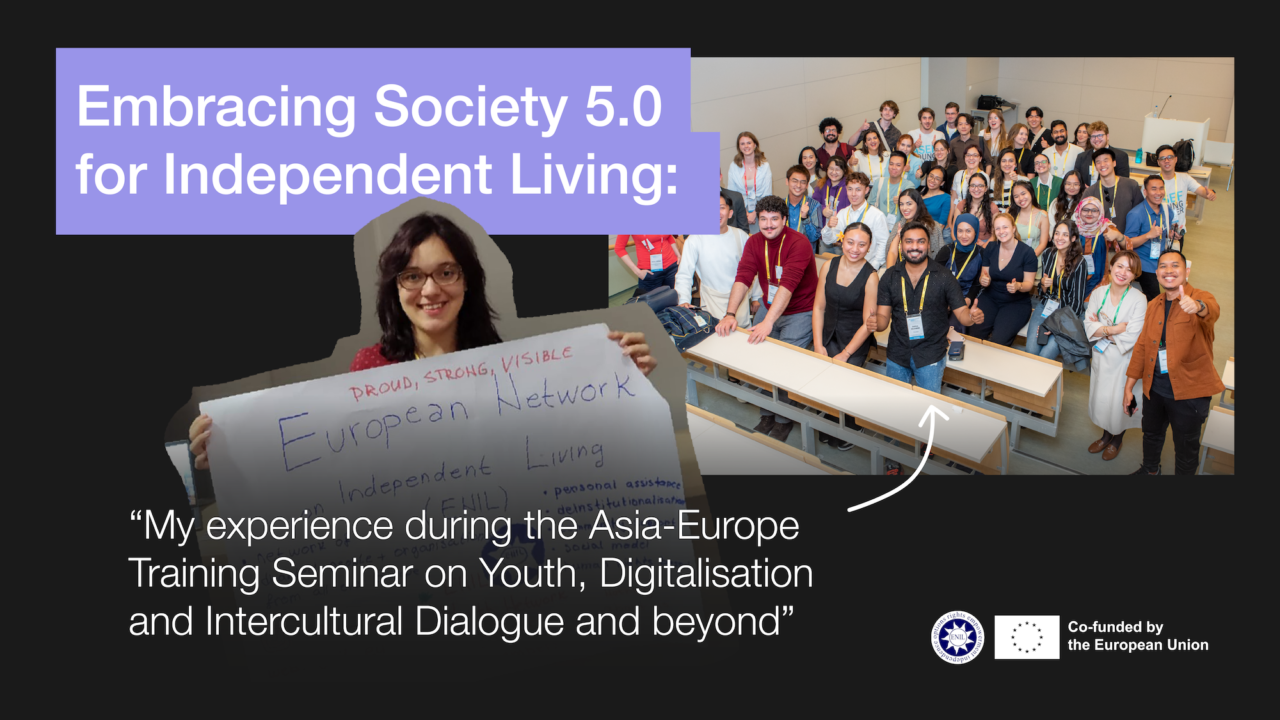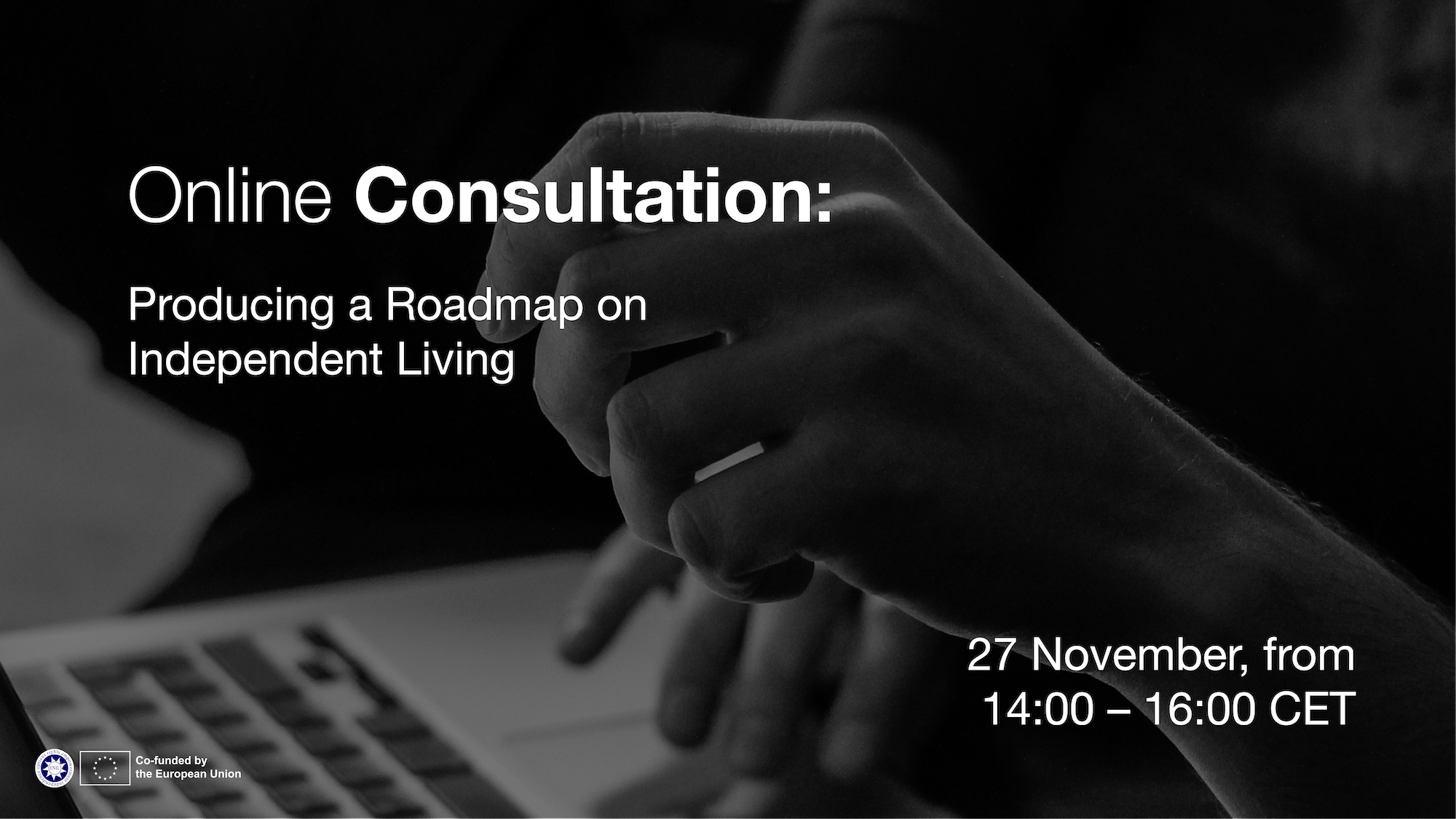Since July this year, I have been involved in ASEF Young Leaders Summit (ASEFYLS) Capacity Buildings. It all started with an online phase in July, followed by in-person trainings in China or Hungary, and it will end with multiplier projects created by participants, which will be done by the end of this year. I was selected to be part of the ASEFYLS 2024 Budapest cohort, and attended the “Asia-Europe Training Seminar on Youth, Digitalisation and Intercultural Dialogue” this October.

Over the course of five days, we took on some of the most pressing challenges of our time, confronting them through the lens of Society 5.0, a concept which was originally developed in Japan but is becoming increasingly influential worldwide. It is defined as a “human-cantered society in which economic development and the resolution of social issues are compatible with each other through a highly integrated system of cyberspace and physical space”.
For those of us in the independent living movement, Society 5.0 potentially represents a powerful framework. It’s a vision that promises not just smarter cities and technological progress but a future where inclusive practices, accessibility, and integrating inclusive design from the start, become natural extensions of the digital transformation in the world.
During the 5 sessions of the online phase, we explored Leadership, Ethics, Inclusion, Sustainability, Personal and Team Leadership skills in the context of society 5.0. In the residential phase, we continued to build upon these topics. We had many opportunities for discussion and intercultural learning while being led by an amazing team of facilitators from the Council of Europe Youth Department and Asia Europe Foundation (ASEF).

At the European Youth Centre in Budapest, with an amazing group of around 40 young leaders from across Asia and Europe, a recurring question in our discussions was: What does this mean for our future and our present?
We reflected on sustainability, technology, digital citizenship, understanding in intercultural contexts, and the ethical implications of AI. Throughout one of the most interesting and varied training seminars I have ever been part of, we engaged in simulations, discussions and group work, which all emphasized the role of ethical governance in shaping the future. Leaders from both continents continuously echoed the need for global standards that ensure data protection, privacy, safety, ethical use and safeguarding, so that technology does not exacerbate inequalities but instead actively promotes equity and inclusion. Together, we reaffirmed the enormous need for enhanced collaborations between the youth of Asia and Europe.
Among many other collective activities and the enriching, entertaining informal evenings, I had the opportunity to participate in two workshops. The first, on Content creation for social issues, allowed me to grow my skills in what I now see as an important tool to build community and drive change. The second, titled “Critical AI” made us all reflect on what the future could look like and how AI is already influencing society. I took the opportunity to highlight how AI can further enhance existing prejudice and biases towards minorities, including disabled people. It is not a friend or the enemy, it is simply a tool. It is biased because it is created by humans, and humans are inherently biased. Ultimately, I will repeat what our facilitator said “ AI is neither artificial nor intelligent“. Agree or disagree, the statement gives food for thought.
Another impactful moment was the activity “Welcome to Sleepyville”. Through a simulation, the day before we presented our Multiplier activity ideas, it highlighted the importance of democratic rights, ethics and privacy, while raising issues about media freedom, media literacy, narratives and inequalities. While my role card was not that of a disabled person, once the activity ended, my de-role was inevitably back into my skin: that of a disabled woman and human rights activist.
And it was enlightening.
At its core, independent living is about self-determination. In practical terms, this means having the power to make choices about how we live, work, and participate in society. Technology is only useful to our movement if it expands freedom and choice.

While Society 5.0 holds immense promise, it is important to recognise that challenges remain. One of the biggest is the digital divide, a barrier that disproportionately affects the disabled community. For it to be inclusive, access to technology must be universal. This means not only ensuring affordability but also addressing issues of digital literacy and support. Moreover, privacy concerns around data sharing are of utmost importance. For disabled people, who may rely on digital tools for essential services, maintaining control over personal data is crucial.
The Asia-Europe Young Leaders seminar reinforced the importance of our shared responsibility in building an inclusive, ethical, sustainable and equitable future. Society 5.0 about more than technology or artificial intelligence: it’s a commitment to human dignity along with technological developments.
As young leaders, we feel a sense of purpose that will guide our actions. Our next steps will focus on support and innovation in our communities, more opportunities to work across borders and to foster inclusive, intersectional, intercultural exchange in an ever changing world. Personally, I am excited about what ideas may come to life before the year is over, and I am looking forward to all it could bring our community.

Written by: Nina Portolan



